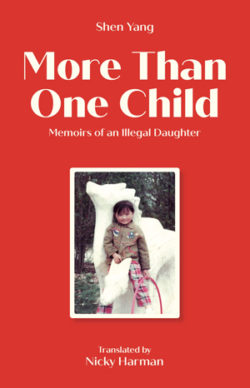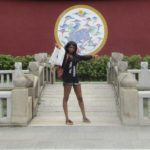More than One Child, by Shen Yang
translated by Nicky Harman
Balestier Press, 2021
Publisher's Blurb
‘I broke a law simply by being born.’
In the late 1980s, Shen Yang was born during the fiercest years of China’s One-Child Policy. As the second daughter of the family, she was a massive liability – an excess child, a product of illegal birth.
From being raised by her grandparents in a remote village as soon as she was born, to being whisked away to her aunt’s home in a distant faraway city, Shen Yang’s existence was doomed to be shrouded in the utmost secrecy and silence. Armed with a false identity and ID card, she experienced years of neglect and humiliation from her aunt’s volatile family who saw her as yet another burden to bear. On top of it all, it seemed her own biological parents had come to forget about her.
In a riveting memoir, by turns witty and inspiring, Shen Yang bravely provides a vivid account of the family planning era in China, as she jots down her journey towards overcoming the limits of her upbringing and forging her own identity amidst the sorrows of her childhood.
More than One Child is not only Shen Yang’s story; it is the untold story of the enormous, yet invisible community of excess-birth children. And this book is Shen Yang’s way of saying goodbye to her childhood, and goodbye to an era.
Reading Chinese Network Reviews
Reviewed by Riya Shah, 2/2/22
 More than One Child tells the adventures and sorrows of a little girl as an illegal child under China’s draconian One-Child policy (独生子女政策 dusheng zinü zhengce). Shen Yang came into this world as 黑孩子 hei haizi, which quite literally means black child, but here, the colour ‘black’ referred not to the colour of her skin but to the lack of a birth permit. Her very existence was unlawful as she “broke a law simply by being born.”
More than One Child tells the adventures and sorrows of a little girl as an illegal child under China’s draconian One-Child policy (独生子女政策 dusheng zinü zhengce). Shen Yang came into this world as 黑孩子 hei haizi, which quite literally means black child, but here, the colour ‘black’ referred not to the colour of her skin but to the lack of a birth permit. Her very existence was unlawful as she “broke a law simply by being born.”
Excess children were considered to be a burden on the family and society. But this did not stop the parents who wanted more than one child. 'Boys are better than girls' (重男轻女 zhong nan qing nü), 'more children mean more prosperity' (多子多福 duo zi duo fu) and 'bring up boys to take care of you in old age' (养儿防老 yang er fang lao); such ancient Chinese fertility concepts were deeply entrenched in Chinese culture, and thus this led to the strict implementation of family planning policies in China, owing to the rise of the phenomenon of ‘excess children’. And Shen Yang was one of them. Her childhood had been intertwined with politics, but her memoir of that childhood is not of a political nature. Instead, it is a very personal narrative which offers an authentic voice to the invisible lives of excess-birth children.
Shen Yang came into this world as a New Year baby, but contrary to her name 'Yang', which means sunshine, she was hardly a ray of sunshine to her family. As soon as she was born, she was sent to the countryside to live with her Nana and Grandad. Even though she was a burden to her parents, she became Nana and Grandad’s ‘jujube-obsessed little treasure’. Her time there was full of mischief and frolics. But that soon changed when her little sister arrived; Shen describes her as the “purple-faced ugly-mug”. And soon she was sent to Aunt Wenjie who was not a delight to live with. Now, she was just an abandoned bumpkin whose “home was where Nana was.”
Yang’s mischievous adventures in school and at home attributed to her nickname, Monkey King. Even though she had a troubled childhood, Shen Yang was as bold as brass and a happy go lucky child. She was quite rebellious in her teenage years and most of it was just a way of venting out her existential dread. We see that the physical and verbal abuse that was meted out to Yang left deep scars and also influenced her future relationships. She became “over-sensitive, suspicious and anxious”. As she underwent the long and painful process of processing her childhood trauma, her boyfriend was there by her side, loving her and cherishing her. Well, I believe that a child is born in and out of love but when the very existence of that child is not acceptable to the society, unfathomable emotional and psychological scars are bound to persist. As Shen says, “…[these scars] have torn us apart and inflicted wounds that will never heal, and which still cause us pain” but at the same time, “suffering has enriched us”.
Yang also shares the stories of her classmates Yuan Xiaohui, Lü Yangguang and Wei Wanjun. Lü Yangguang who often jokingly called himself ‘Donkey Sunshine’ was actually a Sunshine Boy who was one of the brightest students in class but since he did not have the hukou certificate, his education was cut short. These stories demonstrate how the ‘illegals’ were bereft of resources and support. They were not the little emperors (小皇帝 xiao huangdi) and little princesses (小公主 xiao gongzhu) of their parents, instead they suffered all kinds of trials and tribulations.
More Than One Child is an extremely powerful memoir which sheds light on the enormous invisible community of excess children. The incidents of the story are wholly absorbing but at times, they lack stylistic flare and lyrical fluidity. The translation by Nicky Harman is commendable and I can’t imagine how challenging it would be to translate the slogans and policies, but Harman has done it with a finesse only a seasoned translator like herself possibly could. Despite its stylistic flaws, Shen Yang’s insightful observations manages to hook the reader into her narrative and hear her story. Hundreds of stories like Yang’s must have been lost but she manages to commemorate China’s excess-birth generation through her memoir and makes sure that her entire generation would not be buried in the abyss of history.
Reviewed by Riya Shah
Reviewed by Ruth Matanda, 28/12/21
 More than One Child by Shen Yang is a candid telling of the author's childhood as an excess child, children whose parents defied the one child policy which was implemented in China in the 1980s.
More than One Child by Shen Yang is a candid telling of the author's childhood as an excess child, children whose parents defied the one child policy which was implemented in China in the 1980s.
Shen Yang is vulnerable and brutally honest, she doesn’t shy away from topics such as intra-family abuse, the disparity between urban China and rural China, or the brutal ways in which government officials implemented the One Child Policy. Yang’s honesty conveys the complex nature of the One Child policy which is often not explored in the West where it is often depicted as a draconian law which was respected by all citizens. I love how Yang also looked at how the law heightened gender inequality, touching on the role of children especially female children in Chinese society and culture.
Before diving into this book, I must say that I had an erroneous perception of the One Child policy. Like many Westerners, I imagine, I believed this to be something which was not only tightly implemented nationwide but also respected by all if not, the majority of Chinese citizens. Reading the book, it was interesting to see the loopholes which existed and the lengths that parents went to to hide their so-called excess children whether like Yang it was to claim another’s identity or send them off to live with relatives. The depiction which Yang gives of the excess children is one riddled with loneliness, desire for acceptance and of course uncertainty; uncertainty in one’s own identity and place in society. The book constantly highlights the social and personal barriers which excess children face and Yang places emphasis on the role of luck in allowing these children to have a somewhat decent life, whether like her, it’s having a family whose connections can get you a city hukou or financially secure parents. But as the book shows, luck isn’t enough to spare you from living a difficult life.
I thought the contrast between Yang and her friend Wei Wanjun did a great job in showing the social treatment of excess children compared to the more fortunate xiao huang di (little emperors) who are doted on by their parents precisely because they are an only-child. The stark contrast raises interesting questions like, how many intelligent children like Yang’s friend Yuan Xiaohui have been denied opportunities because legally they don’t or should not exist? Were parents who had more than one child morally wrong?
Although the book has its standout moments, overall I was left feeling quite disappointed. I felt as though Yang did not fully utilise language as much as she could have: we are given very vague and pretty boring descriptions of her surroundings, environment and at times even people which made it difficult to fully immerse myself in the story. At times it felt like I was reading a pamphlet with factual information about the author’s life rather than a recollection of stories. There’s almost no conclusion or link between certain events which I can forgive to an extent as the events took place when the author was a child however this leaves the reader with more questions by the end.
Whilst I can empathise that survivors of parent-child abuse can retain complex feelings towards their abusers, I was nonetheless taken aback when at the end of the book, Yang seems to attribute her aunt’s abuse as just being down to her personality, a quirk which her paternal family share as her father was also short-tempered. Whilst it’s made clear that Yang hasn’t fully healed from her trauma, her reflection of her childhood and experiences (whilst valid) was quite disappointing.
I think this is a good book to read for anyone who wants to gain a better insight on life for so-called excess children and the way the One Child Policy affected those living in rural China, however for me it missed the mark, in terms of being a truly great book.
Reviewed by Ruth Matanda
Reviewed by Tamara McCombe, 2/12/21
 China’s family planning policy (the policy) - misnamed in the West as the “One Child Policy”, as in fact there were situations where couples were allowed more than one child and loopholes existed – is famous, yet little literature exists discussing its personal and social repercussions beyond the fact that China’s population is male dominant as a result of the Chinese Communist Party’s (CCP) attempt to curb population growth. Shen Yang worked on her memoir More Than One Child over ten years. Serendipitously it is published in 2021, the year China’s family planning policy changed to allow couples to have three children.
China’s family planning policy (the policy) - misnamed in the West as the “One Child Policy”, as in fact there were situations where couples were allowed more than one child and loopholes existed – is famous, yet little literature exists discussing its personal and social repercussions beyond the fact that China’s population is male dominant as a result of the Chinese Communist Party’s (CCP) attempt to curb population growth. Shen Yang worked on her memoir More Than One Child over ten years. Serendipitously it is published in 2021, the year China’s family planning policy changed to allow couples to have three children.
Shen Yang’s childhood was disrupted to say the least, passing from pillar to post between family members to avoid the authorities who punish families, financial and physically, for having more than the number of children the policy allowed. Adding to the disruption is the fact that her parents and aunt clearly show trauma as the generation of Mao’s “sent down youths” who instead of following academic or society ambitions were forced into rural labour and shamed if their families had undesirable backgrounds. These adults who survived severe poverty and humiliation, forced marriages and dislocation lost the emotional stability to be loving parents and guardians. It is Shen Yang’s misfortune that her upbringing was in their hands. Through the last handful of chapters Shen Yang, with great awareness, unpicks the troubled personalities that are her family. However, her ultimate belief that she was unloved because she was an excess child is misplaced. Regardless of the policy, in my opinion, she would have been raised by those who were unemotionally available by virtue of their own traumatic formative years. The fact that arrangements were made for her to be hidden and a fake hukou (residence permit) bought so she could attend school suggests she was loved but this was not conveyed via outward signs of affection.
The prospect of reading one of the first memoirs of an “excess child”, a consideration of a life hiding from the authorities excited me. Each chapter is a vignette providing a fascinating insight and perspective on hypocritical government employees, the medieval peasant-like lives of rural Chinese citizens even in relatively recent times and the ongoing psychological impact of Mao’s era on the then youths. Yet I finished the book disappointed. There were many entertaining anecdotes but they were written like a history book, event details were listed without descriptions of the physical surroundings, smells or expressions of the characters, hence the book lacked colour or subtle observations. Shen Yang is candid about her emotions regarding her situation and family but the memoir would come across more sophisticated if the reader was shown these emotions and the author’s opinions of the policy if she expressed them through creative descriptions rather than simply stated them. What could have been a new awakening text among the likes of Wild Swans or Chinese Cinderella as such falls short.
The translator, Nicky Harman, explained some of the challenges she faced when translating More Than One Child. There were CCP slogans which needed to convey their literal meaning, balanced with word play and rhythm. Then there was what Harman calls ‘new-speak’ by which I sense she means new vernacular. For example, Harman could not adopt the literal translation of ‘black child’ when referring to illegally born children. The expert translation flows smoothly.
This is a fascinating book recounting a side of China kept out of the country’s textbooks, but lacks stylistic flare.
Reviewed by Tamara McCombe
Reviewed by Michelle Deeter, 18/8/21
 More Than One Child, written by Shen Yang and translated by Nicky Harman, is a deeply affecting story. The book is at times humorous and at times tragic, but it is told with sincerity and a sense of righteousness that suited the book well.
More Than One Child, written by Shen Yang and translated by Nicky Harman, is a deeply affecting story. The book is at times humorous and at times tragic, but it is told with sincerity and a sense of righteousness that suited the book well.
The story begins at Shen Yang’s birth. New Year’s Day is considered a lucky day to be born, but because her family had to hide her from the family planning authorities, her birth was not the least bit lucky. When Shen Yang was extremely young, she was sent to live with her mother’s parents. These first five years of Shen Yang’s life are incredibly happy: she is fed, clothed, and most importantly, loved by her Nana and Grandad. She stresses that neither Nana nor Grandad ever hit her and they always comforted her when she cried. Everything changes when her little sister, the fourth girl in the family, is born. Shen Yang has no patience for the baby, which she calls “ugly”. She becomes more disobedient, and Nana feels she is unable to take care of such an unruly five-year-old.
Shen Yang spends the rest of her childhood with Aunt Wenjie, who is physically and verbally abusive. Her uncle and her cousins are apathetic at best. Aunt Wenjie accuses her of being careless when she gets the mumps at school, tries to teach her how to swim by holding her underwater, and only begrudgingly gives her the money she needs for school. Fortunately, Shen Yang has a happy-go-lucky personality, so she recovers quickly. The reader is also regaled with scenes of her adventures at school, which involve her getting into scrapes and protecting the children who were normally picked on. It was refreshing to be able to read a story set in China about a girl getting into trouble instead of a boy!
The book makes it clear that Shen Yang never gets over the abuse that she suffered. She realizes that she is “in no position to pick and choose” because she is reliant on her aunt and uncle, but at the same time she chafes at the injustice of her treatment at school and at her aunt’s house. Shen Yang never forgives her Nana or her mother for not taking care of her, and she perpetuates the same physical and verbal abuse she learned from her aunt when she meets her boyfriend. As she puts it, “All those years of cold, cruel words had left scars that could not be erased.”
I thought that the list of characters at the front of the book was helpful, and the introduction to the story helped set the tone. This was a devastating phenomenon that happened all over China, but people are generally unaware of the extent of the problem. Being able to read the colorful anecdotes of Shen Yang makes her point more persuasive, but getting the hard facts in the introduction was just as important to show what a massive impact it had on society.
One thing that I do not like about the book is that some threads are left hanging. Why was Yuan Xiaohui’s mother being tied up? Was it something sexual, or was it a misguided attempt to keep a woman with mental problem “safe” at home? What happened to Shen Yang’s sisters? Does she still have a hukou (household registration) in the name of Wu Shanying?
The translation was pitch perfect. The book featured heavy use of dialogue, ranging from children to adults. Translator Nicky Harman manages to give all of the characters believable voices, which meant the book was fast paced and enjoyable. The only change I would make is to use the pinyin names for Shen Yang’s sisters. Everyone is described by using their pinyin name except for her sisters. Using pinyin might make it harder for some readers to keep the sisters apart, but names like Star, Serene, and Moon make them sound like they were part of a fairy tale rather than regular girls born in the 1980s. Star, Serene and Moon are frequently described as “eldest sister,” “third sister” and “fourth sister” in the same sentence anyway. The character list at the front of the book is always available for the reader who becomes confused. But the sisters are mentioned less frequently so it was not a big deal. The book was excellent overall.
Reviewed by Michelle Deeter
